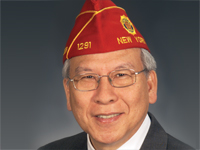
GI Bill allows veterans to pave their own road to recovery.
The Servicemen's Readjustment Act of 1944 triggered a half-century of economic prosperity in America. Successful as it was, the legislation known as the GI Bill of Rights was extremely contentious at the time. How could a nation coming out of its darkest economic decade, followed by nearly five years of overseas warfare, afford to provide free college educations, low-interest loans, unemployment compensation and other benefits to millions of veterans coming home from battle?
To make the GI Bill a reality, it took great determination by The American Legion, including an 11th-hour search for the congressman who represented the swing vote to get the measure out of committee. Congress passed it, and President Roosevelt signed it, while skeptics openly doubted that it would ever generate a return on investment.
Soon enough, the GI Bill was heralded as the most important social legislation of the 20th century. By the mid-1950s, nearly 8 million World War II veterans were college-educated. They used their educations to stimulate unprecedented economic growth. They moved out of their rented urban apartments and into homes of their own. They started businesses, went to work, and raised children filled with hope for their own futures. Veterans proved what they could do when given the opportunity to succeed.
Today, we stand at a similar threshold. A decade of overseas warfare and economic difficulty at home have conspired to leave our nation wondering where to turn for relief. Top officials have promised to leave veterans benefits off the chopping block, but at the same time have threatened the military retirement system and again proposed increasing out-of-pocket costs for veterans who use TRICARE insurance.
If our nation's elected leaders really want to reverse our economic slide, they should pay close attention to the lesson of the Servicemen's Readjustment Act of 1944. Granted, the overall number of veterans is much lower today, but the basic model still applies: it is better for the economy to offer veterans opportunities than it is to cut their benefits.
I took that message to Congress in September. Having been born in China and raised as a legal immigrant in post-World War II America, I know the difference between an economy calibrated by government blessings and one that is fueled by real opportunity. That someone like me can come to the United States, become a citizen, work hard, serve in uniform, have a military career, and now lead the nation's largest veterans organization is a great testament to the power of American opportunity.
This is why The American Legion believes that military experience should count toward transferable credits for certification in related private-sector fields. If you can lead a convoy of Humvees through a bomb-infested desert, you should be able to drive freight from a warehouse to a Walmart. Likewise, the Post-9/11 GI Bill should be available for veterans who dream of brighter futures, whether they wish to be welders or genetic researchers. Veterans have paved the road to recovery before. They can do it again, if given the opportunity.
- Magazine

